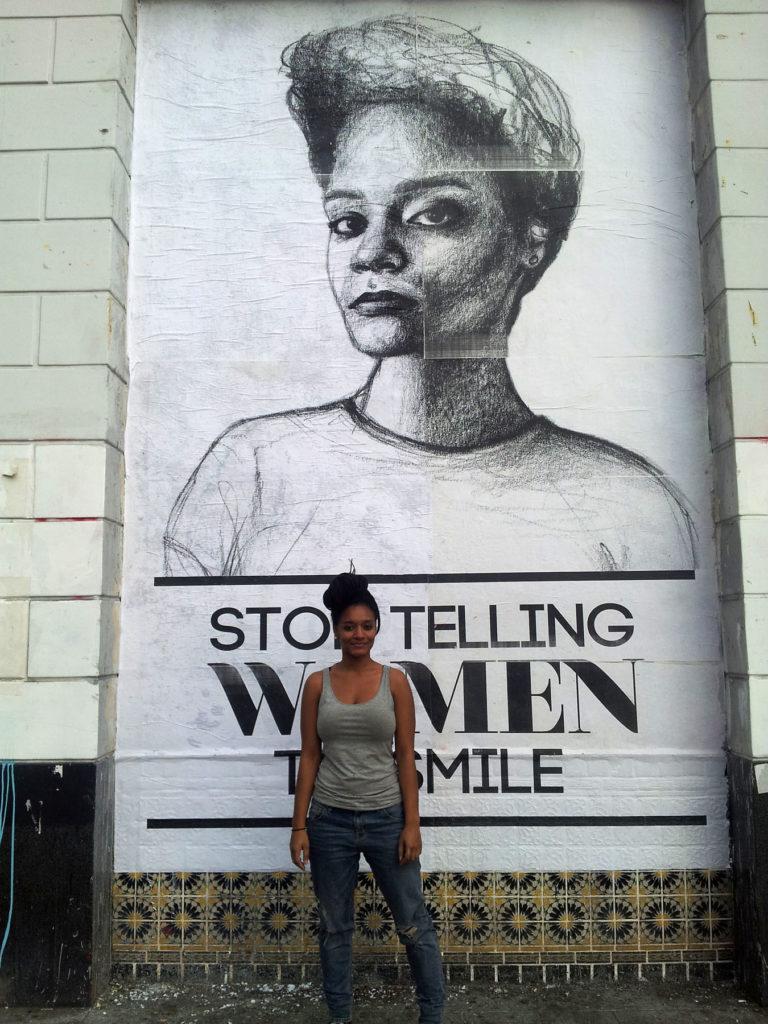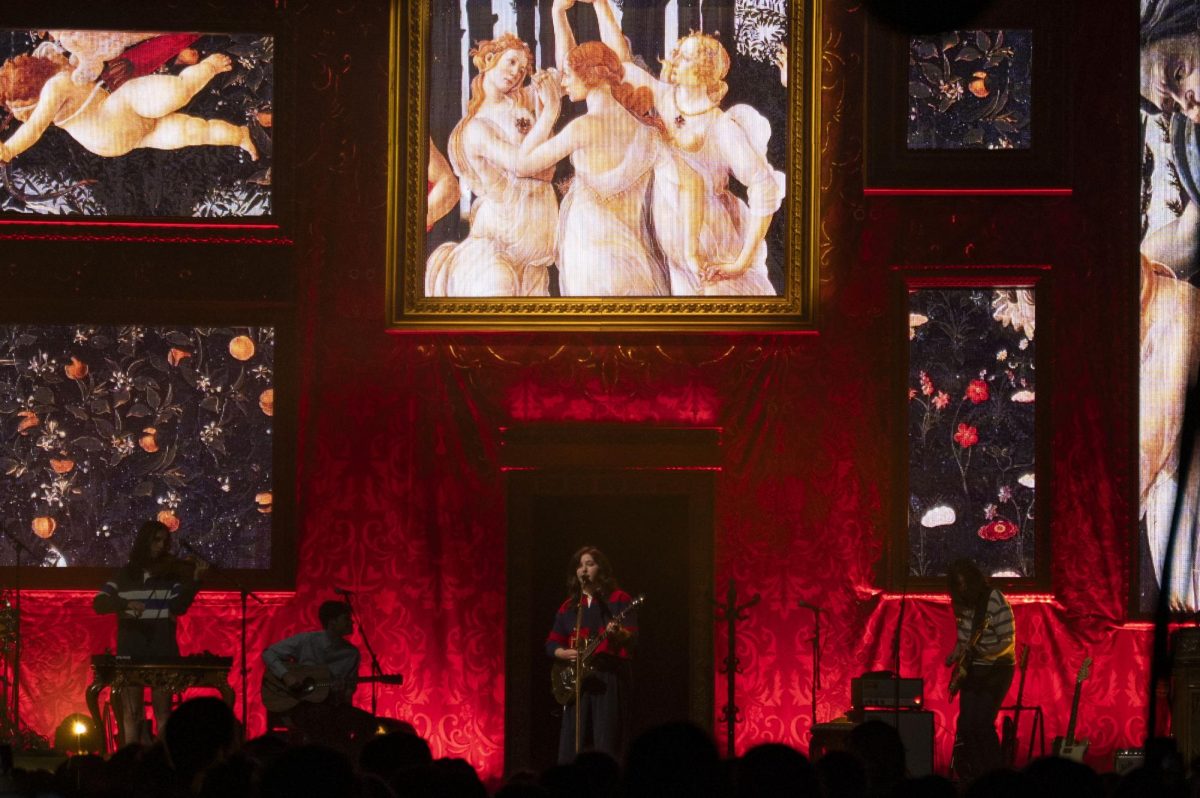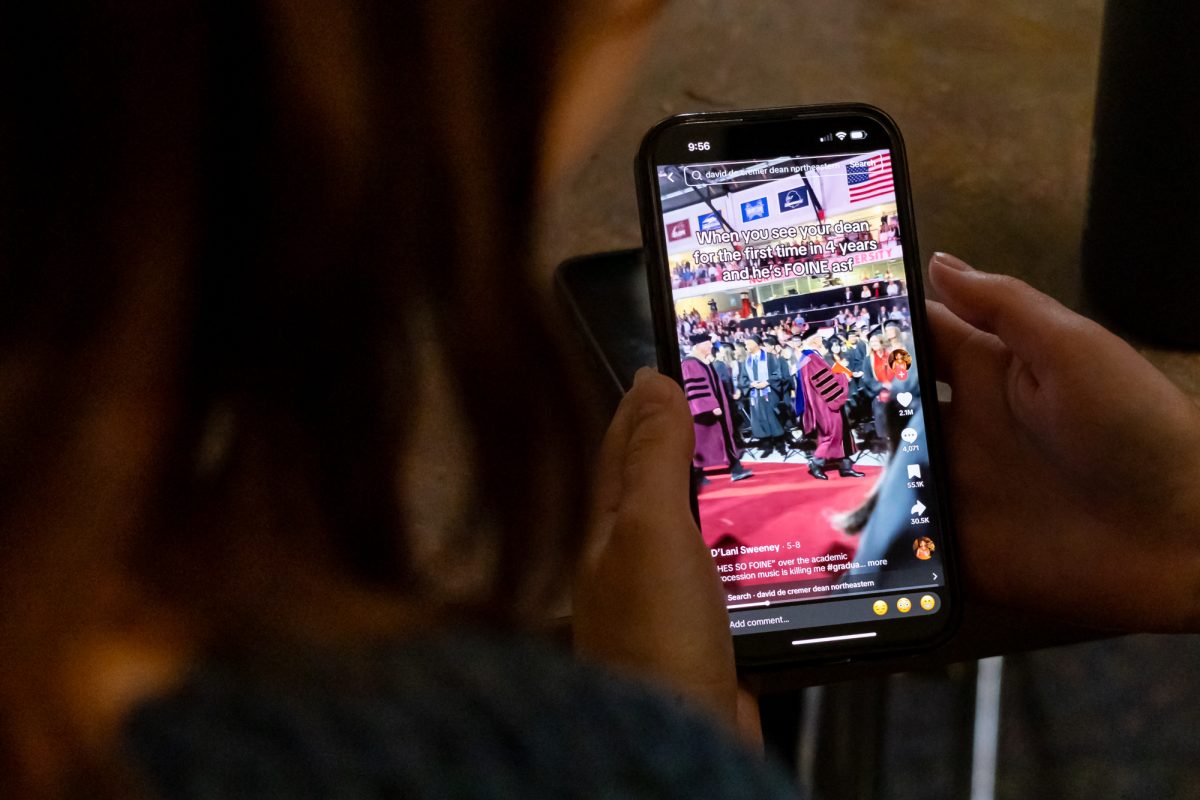By Rowena Lindsay, Deputy Inside Editor
Years of objectification and catcalls may have taught many women that it is safest to swallow the embarrassment and anger and simply ignore their harassers, but Tatyana Fazlalizadeh, the street artist behind the “Stop Telling Women To Smile” anti-street harassment project, isn’t letting it go anymore.
Fazlalizadeh, whose art speaks back to her harassers, is coming to Northeastern as an artist in residence from Oct. 6-9. The goal of her visit is to raise awareness for the anti-street harassment movement through art, and show that art can be a vehicle for advocacy and change.
Originally an oil painter, Fazlalizadeh switched to sketching posters and putting them up on the streets with wheat paste when she decided she wanted to speak out against street harassment. To find inspiration for her artwork, Fazlalizadeh sits down with women and talks to them about their experience with street harassment. She then draws portraits and chooses quotes about their experiences to be displayed below the picture.
“Tatyana’s work shows that creative means can be used to have important conversations, we can be doing something fun like creating art or creating music and still be having those conversations,” Sarah Jackson, associate professor of communication studies and committee member of the women, sexuality and gender studies program, said. “The other important thing she brings is the idea that women themselves are powerful, [that] even women who experienced harassment or feel unsafe have the power to speak back.”
While at Northeastern, Fazlalizadeh will be wheatpasting her artwork on Nightingale Hall, where it will stay until the paste dissolves.
“We have asked her to focus on bringing portraits of college aged students [and] women from Boston, so she is actually bringing back some portraits of Northeastern alums that she drew on a previous tour through Boston,” Director of NU Center for the Arts Bree Edwards said.
Northeastern has organized an anti-street harassment block party in Centennial Commons on Oct. 7 from 2 – 5 p.m., where Fazlalizadeh’s wheat pasting will begin.
“[The block party] will be a combination of art and information about resources on campus,” Edwards said.
The event includes booths for Northeastern student groups such as Strong Women Strong Girls, Girls’ LEAP, Acting Out, Northeastern offices such as O.S.C.C.R, ViSION, the Office of Institutional Diversity and Inclusion, the Office of Health and Counseling Services and community partners such as Hollaback! Boston.
Hollaback! Boston is an organization that works to end street harassment by giving women a place to share their stories and empowering them to fight back. They have been helping organize the block party along with Northeastern student Shelby Sih, a third year communication studies and political science combined major.
“[Hollaback! Boston is] playing a big role and tapping into their networks also because their whole program is based around street harassment, so they have really provided us with a lot of different resources and seeing that the event comes together,” Sih said.
Acting Out, a theatre group on campus that performs short plays with a social message, will be teaching attendees how to do bystander interventions for situations when they witness any form of harassment. In addition, Girls’ LEAP will be doing demonstrations on how students can defend themselves if they become a victim of harassment.
On Oct. 7 at 5:30 p.m. in Dockser Hall, Fazlalizadeh will be participating in a panel at the law school called Public Art, Public Policy about Title IX and the Clery Act, which requires all colleges and universities that receive federal aid to disclose information about crime on and near their campuses, with the Office of Diversity and Inclusion.
“She is going to be talking about the role art and activism can play in gender equality efforts on college campuses,” Jackson said.
She will also be speaking to several classes including Jackson’s Communication Inclusion class and associate dean of the College of Arts, Media and Design Greg Goodale’s Social Movement and Communication class.
It was the communication studies department and the NU Center for the Arts that organized the residency.
“She is very well-known in feminist political activist spheres and art activist spheres and so I actually connected with her online through social media,” Jackson said.
Jackson then contacted Goodale and Edwards about bringing Fazlalizadeh to campus.
“The residency involved the creation of public artwork and that is part of Northeastern’s new public art initiative, which is the new mural and the elevator artwork,” Edwards said. “Her art will have a permanent place on campus so we worked with the public art initiative.”
In the past few years, many universities have come under fire as mishandled cases of abuse and sexism on their campuses surfaced in the news. In May, Northeastern made the news as a former student filed a complaint against the United States Department of Education over her mishandled rape case.
“I don’t think issues of gendered violence are new on college campuses, I just think that we are at a place now where nationally we are having a conversation about it,” Jackson said. “It allows us as members of the Northeastern community to think about our own role in creating a model that we would like to see society as a safe space place where these conversations are happening and people are willing to think about their own biases or their own ways of thinking that maybe can be challenged.”
According to Edwards, throughout Fazlalizadeh’s residency Northeastern will be working with policy makers and the law school to try to make the campus a place that is safer for students and intolerant of gendered harassment, showing that art can be used as a tool for advocacy as well as positive change.
“Having Tatyana’s artwork here on our buildings will just serve as a really strong constant reminder to anybody walking through that area that we are taking as stance against street harassment,” Sih said. “I think the visual is just a really great reminder to either feel empowered, have a conversation or just to know that we have a university that is standing against this.”
Photo courtesy Tatyana Fazlalizadeh: SWTS.









